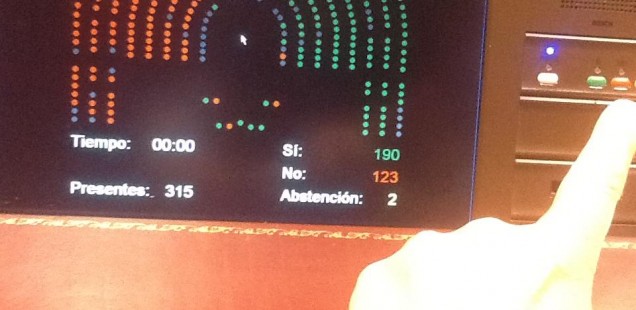Spanish MP Gave Power to the People | PirateTimes

Spanish MP Gave Power to the People
The roots of a democracy as it should be is giving the power to the people, and this was done recently by a Spanish Member of Parliament.
Joan Baldovi, a Member of Parliament for the Greens (Compromís-Equo) was persuaded by members of a free software development group to use “agoravoting”, an online voting system that is being used by the Pirate Party of Madrid, to directly ask the Spanish people for their opinion on a current bill
The bill in question was the Transparency Act, a bill being considered as a cover for politicians coming to the parliament amid governmental corruption scandals. Through an online voting platform, developed by agoravoting, Baldovi asked people to vote “yes” or “no” on 8 questions, and committed to transfer their will to the Parliament.
The response to this call was great; 2 280 citizens participated in this direct democracy experiment which took place for five days (from Sunday 8 to Thursday 12 of September, 2013) and 1 766 of them (79 %) asked Baldovi to press the red button and vote against the Transparency Act. Baldovi, when pressing the red button with his finger, stated that he did it in the name of the people.
The development of technology and the Internet have built the infrastructure to implement citizens’ participation in the legislative process and open the door to the future of politics. The first steps in this direction have been taken, and the time that processes of direct democracy could be implemented in each country is not far away.
Pirates of Iceland recently adopted an online Parliament Viewer that shows how MPs have voted on a single bill. Pirate Parties in general are using such digital platforms and strongly stand for participation of the citizens in decision making.
There are multiple benefits rising from these kind of political activities; MPs and citizens come closer, MPs know what people want and the peoples’ voice is heard in the parliament.
How valid are online voting systems?
Systems evolve to ensure the validity of the votes, to avoid double voting and to maintain the secrecy of the vote. There are those who do not agree, because they do not trust online voting and believe that the results can easily be manipulated. We asked Eduardo Robles, the main programmer in agoravoting, about all the above.
This voting supported different methods of authentication that ensured no double vote was casted and that all the votes were valid:
- verified sympathizers and party members from Compromis or Equo received an email with an unique url from which they could register as a verified user.
- Spanish citizens with an FNMT digital certificate could authenticate and create a verified account. Millions of people have this kind of FNMT digital certificate in Spain because it’s used to send the taxes via Internet each year.
- any other spanish citizen could register an account sending their scanned ID card, which we verified manually to see that it’s valid and hasn’t expired.
- We tried to maintain high-security authentication requirements meanwhile providing a way for everyone to be able to vote.
About the secrecy of the vote, effectively the vote was secret. We’re working in adding mixnet based-encryption support into agora and we hope that in the next big voting we will be able to use it.
As for technical conclusions, I can say that we detected some usability points that need to be improved, and we need to work in a mobile-ready version of Agora. We are a small community, we didn’t receive any grants so we haven’t got much development resources, but we’ll certainly do our best to improved the project in the future as fast as we can. We might in the future do a crowd-funding campaign to accelerate development.
Featured imaged is CC BY-NC-SA Joan Baldoví.

About Stathis Leivaditis
The English “pirate” is derived from the Greek word “πειρατής” (peiratēs) and this in turn from the verb “πειράομαι” (peiráomai), “I attempt”, which is a derivative of the noun “πείρα” (peîra), “experience”. Coming from the depths of the centuries, the word “pirate” took on another dimension in our days. The ruling classes saw pirates as rebels and hated them. Rebels without a state, they were not submissive to any law, except from the laws they instituted themselves, improvising together. This is the feeling of a Pirate: when something doesn’t work, you have to attempt to bring a new concept. Sometimes it goes beyond a certain point and perhaps exceeds certain limits, because it is an expression of challenge; the challenge to change the system. I’m a member of the Board (and former chairman) of Pirate Party of Greece, also a member of press team of PPGR, former journalist, now a free lancer. I’m in the team of Pirate Times from the start, I joined voluntarily and consciously because I am interested to meet pirates from around the world, to exchange views and spread the pirate spirit.
All content is CC-BY if not mentioned otherwise. Please link back to us if using content.













Per Ekström
paco229
JorgenL